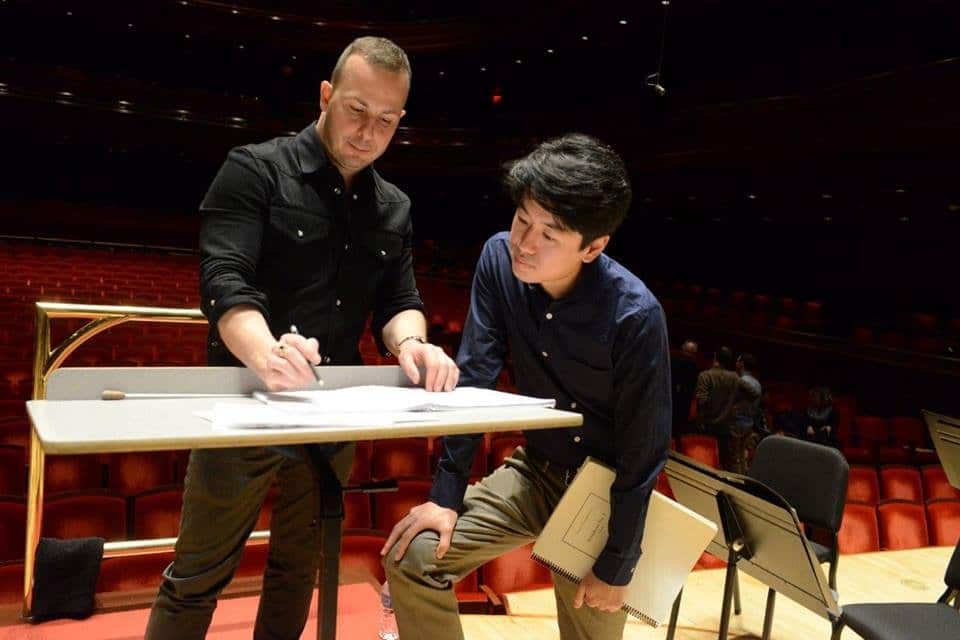Music from Thomas Tallis’s motet Gaude gloriosa was found buried in the walls of Corpus Christi College, Oxford, in 1978. Recently, the conductor David Skinner has identified the text as being by Henry VIII’s sixth and last queen Catherine Parr.

The words are from Parr’s psalm paraphrase ‘Against Enemies’ in her first publication Psalms or Prayers, published in London in 1544, and were set as a contrafact of Tallis’s Gaude gloriosa Dei mater.
The work will be performed at St John’s Smith Square London on Good Friday (14 April 2017).
David Skinner says: ‘These discoveries are not only significant for cultural historians, but also fundamentally challenge our perceptions of Tallis’s music and chronology which have hitherto been fixed in their essentials for nearly half a century. We also have new insight into the role of a Tudor queen in Henry’s court politics. The musical Reformation seems to have come to England somewhat earlier than anticipated. Many fascinating avenues for further research, both musicological and historical, have opened up for the years to come.’
David Bernard was conducting a Brooklyn Symphony concert this weekend when a little boy started talking between two pieces, Firebird and Scheherezade, and would not stop. Audience members told the mother to take him out.
The conductor invited the mother and boy to sit in the front row. He told the boy: ‘I need your help. I forgot how many times the Scheherazade theme is played by the violin soloist, and I’m hoping you can count them for me.’ Each time the theme came round, the conductor turned to the boy and showed him on his fingers how many times it was.
The idea worked. The boy was perfectly behaved throughout the piece.
This morning, the orchestra received a letter from his mother:
‘I want to thank BSO for today’s wonderful concert. I also want to acknowledge the impeccable character of conductor David Bernard. I’m the mother of the little boy that became quite noticed in the middle of the set. David was remarkable how his way of being kind and generous towards my son transpired. Thank you. Although many viewers were not pleased, people approached us after the concert and were so proud. They were proud of my son and the way David created an opportunity to be loving. My son and I traveled from South New Jersey, near Philadelphia, you hear these 2 pieces as they are some of my son’s favorites. My son wants to be a conductor. He is just 8 and also on the autism spectrum. He’s an extraordinary genius. He’s so loving that he meant no harm. He was very excited. Thank you again for this was a huge day for him. All his teachers knew he was coming even before him. It was a surprise. Overall, my son loved it all and he can’t stop talking about the 5 times the violin played and that he counted. Thank you again. Please let David know. Regards, (name withheld).

A week ago the Wall Street Journal magazine published a 12-page spread on the performing arts school.
Initial reactions ranger from ‘that’s a nice piece of PR work’ to ‘this is eactly the sort of thing that gives classical music a bad name.’
The photographs showed preppy-looking types in designer clothes larking around at the school.
The feature is paywalled so we can’t show you very much.
But one concerned relative has been troubled by a significant, injurious bias in the promotion.
Here’s what she writes:
The Wall Street Journal’s April 3rd online magazine feature on Juilliard students with photographs taken by Thomas Gebremedhin could benefit from your attention. More specifically, the sheer absence of any Asian or Asian-American students from an otherwise diverse collection of several fashion forward musicians and dancers strikes any student, faculty/staff member, alum, or patron of the venerable institution as, well, peculiar.
Independent of one another, a cellist named Mosa Tsay and I both pointed out this omission of a specific demographic on Twitter. It seems that either Mr. Gebremidhin or members of the editorial staff at the Wall Street Journal may not be inclined to regard Asian musicians as attractive enough to merit visual attention in the newspaper. Since students with cultural backgrounds stemming from Korea, Taiwan, China, Singapore, and Japan constitute a rather large percentage of the population attending Juilliard these days, the lacuna of such faces is startling, to say the least. One wonders whether a deliberate omission has taken place rather than an unintentional oversight. The photographer who attended both Duke and Philips Andover, according to LinkedIn, might be best positioned to answer this question accurately. Apparently, he has not responded to Ms. Tsay’s inquiries.
Any assistance you could offer to draw attention to the hurt and insult felt by young dedicated musicians with surnames such as Lee, Wang, Kim, Zhang, Takebe, and Yu would be greatly appreciated. My niece who attends Juilliard is deeply injured, as are many of her friends. However, she does not believe anyone would support her if she were to raise the issue. I told her I would do what I could on her behalf.
Juilliard is heavily dependant on its intake of Asian students. Who was on call when the photographer came round?

photo (c) Zoë Ghertner/WSJ.
From the Chinese-American pianist’s Observer interview with the well-dressed Fiona Maddocks:
“If a beautiful male pianist wears tight pants, I’m not going to think, ‘What’s in those pants’?” Really not, Yuja? Hoots of laughter. “OK, maybe. But if the music is beautiful and sensual, why not dress to fit? It’s about power and persuasion. Perhaps it’s a little sadomasochistic of me. But if I’m going to get naked with my music, I may as well be comfortable while I’m at it.”
Full interview here.

photos: Youtube
The Royal Danish Theatre in Copenhagen has named John Fulljames as its next head of opera.
John has been Associate Director of Opera for the Royal Opera in London since 2011. He was beaten by Oliver Mears to the artistic director job last year when Kasper Holten moved back to Denmark.
Copenhagen is a swing-door house where directors resign every two or three years over the next round of cuts.
John needs to watch Borgen.

photo © ROH / Stephen Cummiskey 2014
Laurent Bayle, director general of the Cité de la musique and the Philharmonie de Paris, has been appointed head of Strasbourg’s modernist Musica festival.
Bayle founded Musica in 1982, before he went on to Parisian glory. He returns to replace Rémy Pflimlin, who died in December. It’s not clear how long he can hold both jobs. He’s not a conductor, after all.

Saturday night’s audience in Philadelphia was informed before the concert that Yannick Nézet-Séguin was unwell.
Up steps Kensho Watanabe, the recently installed assistant conductor, and (according to our observer) delivers a terrific account of a long and difficult programme – Mason Bates’s “Alternative Energy”, Daniil Trifonov in Mozart’s K271, Beethoven’s Prometheus prelude and finale and Liszt’s Prometheus symphony.
Our observer writes: ‘Watching the emergent conductor command this magnificent orchestra with such grace, dignity and warmth, while hearing (and feeling) the ensemble react to his direction with ease and understanding felt like nothing short of magic. For those of us fortunate enough to be there, the multiple standing ovations and the collective cheers signal the start of a brilliant career. Congrats to the young maestro.’
Kensho, a Japanese-American, is a Curtis grad. Philly likes to keep it local.

Credit: Pete Checchia
There has been no mention of the substitution on the orchestra website, or in other media.







